New York summers can do more than make you sweat—extreme heat stresses the cardiovascular system, raising the risk of chest pain, fainting, dehydration, and leg swelling, especially if you live with PAD, venous disease, heart failure, or take certain medications. Here’s how heat affects circulation and what you can do to stay safe.
Why heat strains your heart and blood vessels
When it’s hot, your body shunts blood toward the skin to release heat. Blood vessels dilate, heart rate climbs, and you sweat to cool down. For people with narrowed arteries, stiff vessels, or reduced pumping capacity, this extra workload can push symptoms over the edge. Studies and scientific statements continue to link heat waves with increased cardiovascular hospitalizations and mortality, especially in older adults. (AHA Journals, Nature)
Medications that can raise heat risk
Some common prescriptions increase dehydration or impair heat dissipation, including diuretics, certain antihypertensives when dehydrated, and anticholinergics or psychotropic medications. The CDC has issued specific clinician guidance on managing meds during heat events—dose timing and hydration plans can make a real difference. Don’t adjust on your own; talk with your care team. (CDC)
Who’s most vulnerable?
- Adults >65 or with chronic conditions (heart disease, kidney disease, diabetes).
- People with PAD or venous insufficiency, where circulation is already challenged.
- Those on the medications above, or with limited access to air‑conditioning.
- Outdoor workers and athletes training in the heat. The American Heart Association flags these groups as higher‑risk during heat advisories. (American Heart Association)
What heat does to PAD and venous symptoms
- PAD: Dehydration can thicken blood and lower blood pressure; both can worsen leg ischemia and dizziness. Heat exhaustion may mimic or trigger symptoms.
- Chronic venous disease: Vessels dilate and valves leak more, leading to ankle swelling, heaviness, and throbbing. Compression may be extra helpful on hot days—choose breathable options.
A heat‑safe plan for vascular patients
- Check the forecast with a heat‑risk tool and plan indoor hours when risk is high. NYC posts heat alerts and cooling‑center info; heed them. (New York City Government)
- Hydrate on a schedule, not by thirst alone. Water is usually enough; add electrolytes if you sweat heavily or take diuretics (ask your clinician). (CDC)
- Pre‑cool your day: morning walks instead of afternoons; air‑conditioned routes for errands; shaded paths for exercise.
- Dress for circulation: light, breathable fabrics; graduated compression if you have venous disease; supportive walking shoes to keep strides efficient.
- Heat‑smart meds: Keep pills out of hot cars and sunny windowsills; ask whether any doses should shift earlier on high‑risk days. (CDC)
- Know warning signs: heavy sweating that stops, confusion, fainting, pounding pulse, chest pain, or severe leg pain—call 911.
- Post‑procedure precautions: After vein or artery procedures, avoid prolonged heat exposure until your clinician clears you; heat can worsen swelling.
Travel and work tips
- Flights/long drives: Hydrate, avoid alcohol excess, stand or calf‑pump every hour to reduce clot risk.
- Outdoor shifts: Rotate tasks, schedule breaks in cooling areas, and buddy‑check for confusion or slurred speech—early signs of heat illness. Employers should have written heat plans; ask your supervisor how to access water and cooling.
How NYMVCare keeps you safer in summer
- Personal heat plans for high‑risk patients (PAD, heart failure, diuretic use).
- Medication reviews before heat waves.
- Compression fitting for venous patients, with breathable options for hot weather.
- Same‑week access if heat worsens leg swelling, wounds, or claudication.
The bottom line
Heat waves are more frequent and intense, and they raise cardiovascular risk—but a few smart steps keep most people safe. If heat has worsened your leg pain, swelling, or dizziness—or you’ve had a recent vascular procedure—call 1-877-877-111 or book online. We’ll tailor a summer‑proof plan for your heart and legs. (AHA Journals, American Heart Association, CDC, New York City Government)
Educational content; not medical advice.


